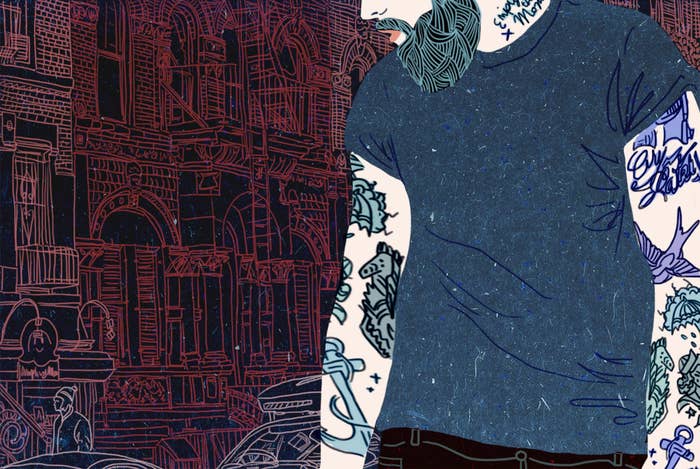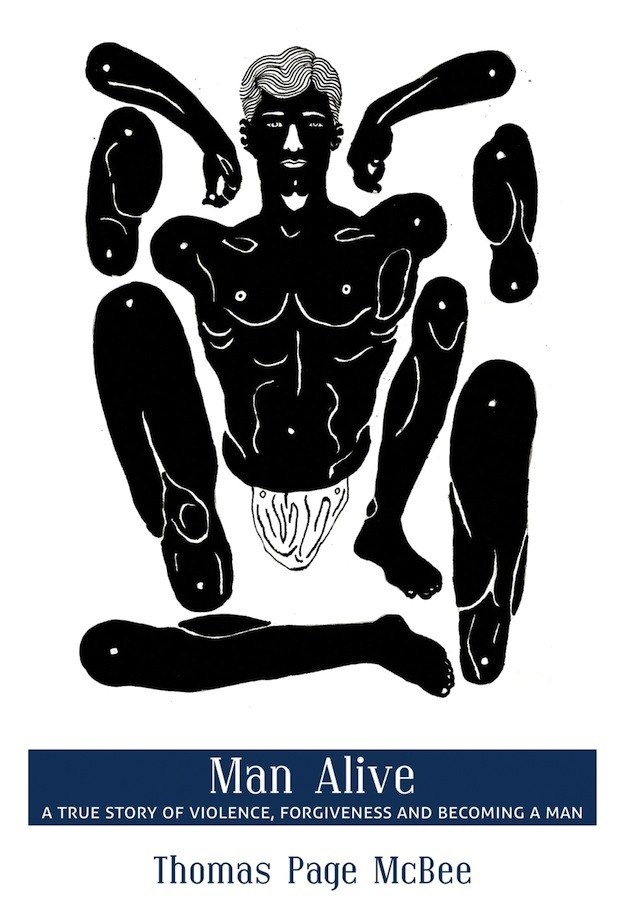
My mom bought me a pretty, twilight-blue dresser back in the spring. I'd just moved for the third time in a year and was broke in that desperate, "Should I buy this plunger or wait until next week?" way moving breaks you. She'd come into a little bit of money and asked me if I needed anything.
I was 33, a new man — new to New York and manhood itself, only three years on testosterone and freshly bearded — and I needed a lot, really. My missing inventory belied the loneliness of that winter and the bachelor, sweaty summer since I'd moved from New England, dream-dumb and starting over in a city full of tattooed, bearded men who looked just like me. I didn't own silverware, a table to sit down to — civilized tools of home that said: Here is a man who goes to sleep each night and wakes up knowing he belongs in the world. Aspirational, really — like my pricey Lower East Side studio, like the muscle of my body, like my self-made life.
Still I asked her for the dresser, embarrassed and eying the stacks of clothes on the windowsill. There were factors: a woman I'd just started dating and wanted to impress, who'd inspired in me nesting desire for spicy candles and good towels and a place to put my clothing.
Mom said, "Sure, honey." A few days later she emailed to let me know that the dresser was on its way, and that the assembly looked "complicated." I thanked her and tried not to be insulted by the implication.
It arrived that weekend in three boxes, flattened into dozens of numbered parts and accompanied by hundreds of bits of hardware. I unpacked the whole thing the day of my housewarming party, swore mightily, and promptly shoved the disassembled pieces under my bed.

Days after the party my mom called again. "How's it look?" she asked, and I stared, humiliated, at my growing pile of T-shirts, toppling in a pile onto the floor. I thought of the bones of the dresser, gathering dust beneath me. I thought of my inability to make a real home. "Great," I told her.
"You get it put together OK?"
"Yeah, it was easy to put together, actually," I said.
"Good boy," she said. Later that year, my mom would go to the emergency room of the hospital where she would eventually die, and who knew then that this was her last act of maternal nurturing, one of a million such gestures, cohesive after death but hard to define during life, the many small ways Mom was my mom.
"It's perfect," I said, feeling tender at her. We were speaking to everything we'd never said, of course. Like: I wish I could have bought you a thousand dressers, let's make up for lost time. Like: I'm sorry that this is so messy, thanks for making room for the man I am — a soft heart in a boxing glove. A man who can put it together; a man who knows how to fall apart.

"What makes a man?" was my question for years and in this beard, these muscles, this echolocation of body language I use to track my movement in space, I found my answer.
Or, I found two: the man I am and the man the world wants me to be. The "man up" versus the man I am.
The tools that helped me bloom like a bristled flower — the spiked needles, the nippled vials of testosterone, the blood tests and bandages — are crude as the violence of my initial arrival, a new man in my thirties, brawny and birthed full-grown into a world I thought I understood but, in fact, I hardly knew at all.
I am a disruptive man, in my ripped T-shirt or pressed white Oxford, with my hand tattoos and smart guy glasses, passing like Clark Kent at work and in barbershops with bros who hassle me kindly about my girlfriend, she who requests, always, that they not cut out my curl.
I know the rules and I break them, at the outdoor bar where I locate in myself a surprisingly passionate, deep knowledge of Sex and the City, which makes me dissonant and strange to the straight woman I'm talking to, but I go on anyway.
My body is a technology, a miracle, a testimony, a call and response.

My body is expected. To know the score at a sports bar. To pay, when I'm with a woman, for this taxi, that drink. To decipher unwieldy directions delivered to me, man to man, at gas stations. To uphold, at all costs, my vulnerable masculinity.
Because — like all men — it's at stake. And — unlike many men — it's occasionally blurry. I can see, in their curious squint, their attempt to strip my face of this beard, this strong jaw, to imagine these features softer, more feminine. I know that I'm scrutinized, that when my uncle leans away from my hug and offers a hand instead he thinks he's helping me. "Men don't hug, Thom," he says.
I do, though. It's just the man I am.

I didn't build the dresser until summer, three months after I moved into my apartment on the Lower East Side, a home with silverware my girlfriend bought at the store down the street, her shirts stacked next to mine on the sill. I had the bones of that dresser out from under my bed and scattered on the floor of my apartment, finally assembling it because my girlfriend asked me to, because I knew what she meant was: Please make a space for me here. So I drank a beer and got to work while she wrote in the bedroom and I felt nurturing in a new way, one that felt honest and clear in this body, this life. I don't perform my masculinity — I embody it.

Sweaty and making slow progress with the dresser, I was interrupted by my mom, calling from the hospital, and I abandoned the mess to sit on the edge of my bed and attempt to unpack her jumbled logic, to translate the toxins infiltrating her brain into a language I could understand. Mom had become a child, my child. I felt fierce and helpless with her fragile body suddenly in my care, protective and gentle and lost, much like she must have once felt about me. I told her stories I'm sure she didn't follow about the day I had spent on Governor's Island, how I would take her there when she came to visit, how she'd stay at this apartment she'd never seen, how it looked so nice with the dresser she bought me. Because I knew it would, I knew it was true, and anyway I was speaking to everything I'd never said. Like: Please don't go. I don't know how to live without. I know you'll never see this dresser.
Within minutes, I could hear the drill kick up behind me, the busy sounds of a project nearing completion, all the tenderness I had put into it reflected back to me.
I hung up the phone and watched my girlfriend. She'd made more progress with the dresser in 15 minutes than I had in an hour. The kicker was, I knew she'd hand me back the hammer. She knew I needed to fix something that wasn't already destroyed. So for a long minute, I stayed quiet and kept my eyes on the soft pop of muscle in her back.
When I put my hand on her exposed shoulder, she turned toward me, kissing me on the cheek. I sat for a minute and looked at what was left to be done, glad to finish what I'd started, warm with the brutal romance of the moment, the wonder of a life I could make myself, full of love as rough and soft as my body, alive in a way I could more than man up for.
***
Thomas Page McBee is the author of Man Alive: A True Story of Violence, Forgiveness, and Becoming a Man (City Lights). He writes the columns "Self-Made Man" for the Rumpus and "The American Man" for the Pacific Standard, and his work on gender has appeared in the New York Times, The Atlantic, VICE, and BuzzFeed. He lives in New York City, where he works as the Growth Editor at Quartz.
To learn more about Man Alive, click here.

